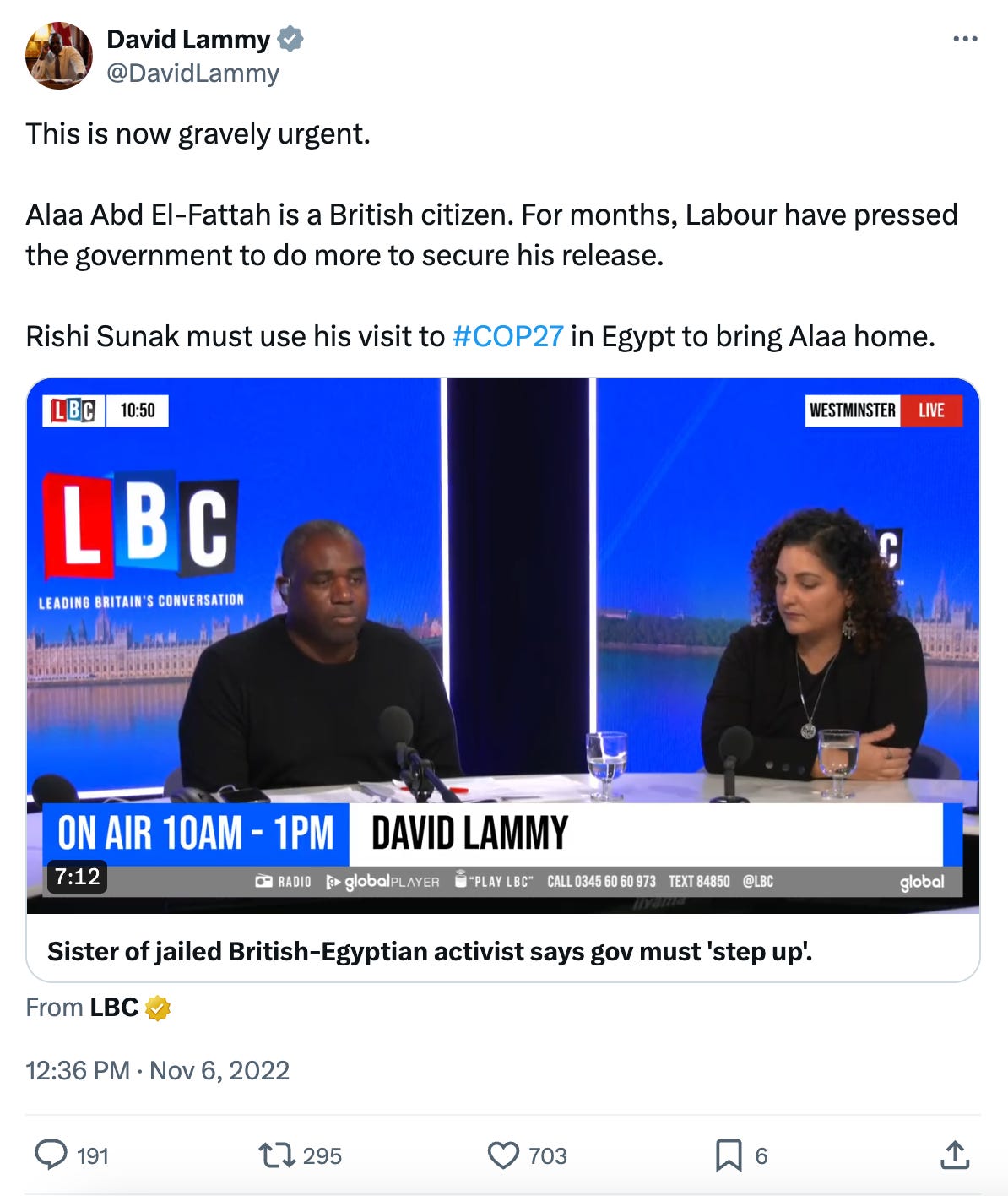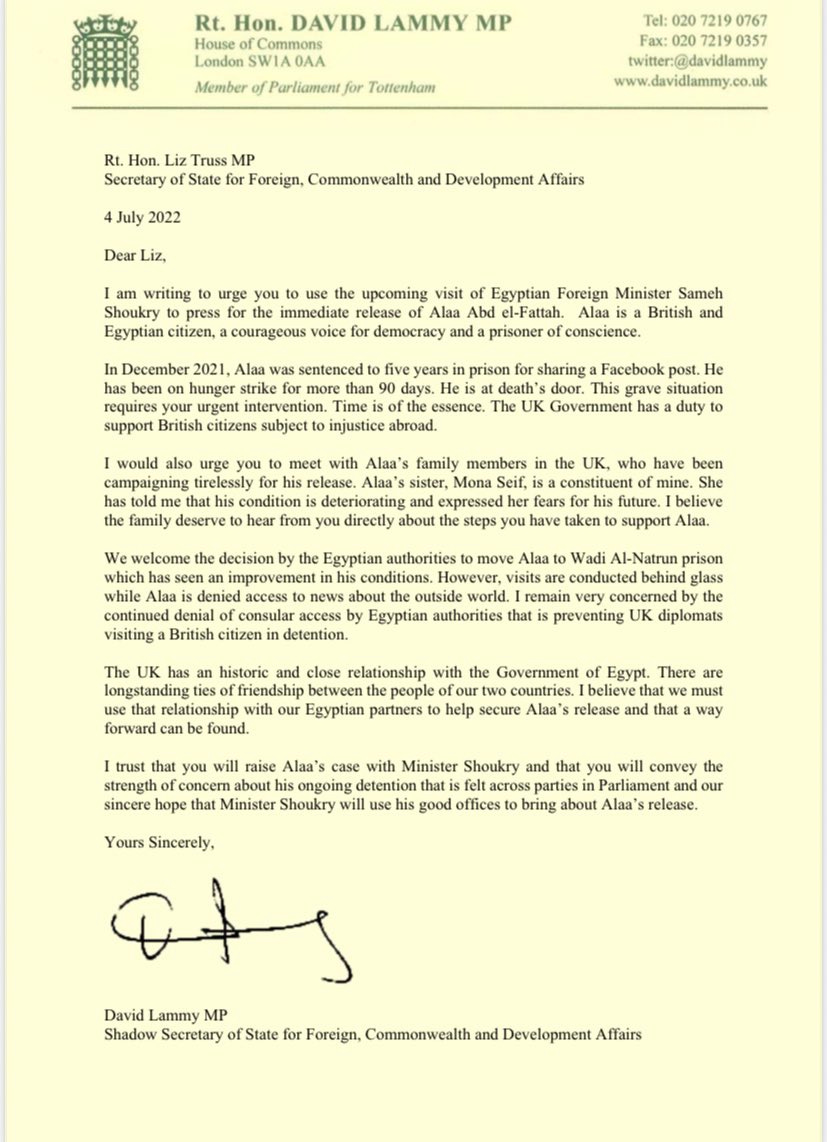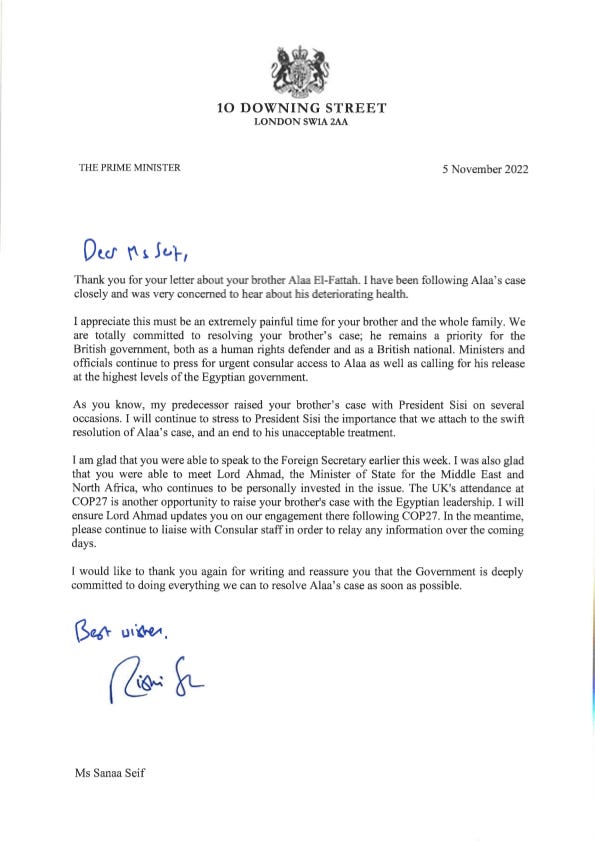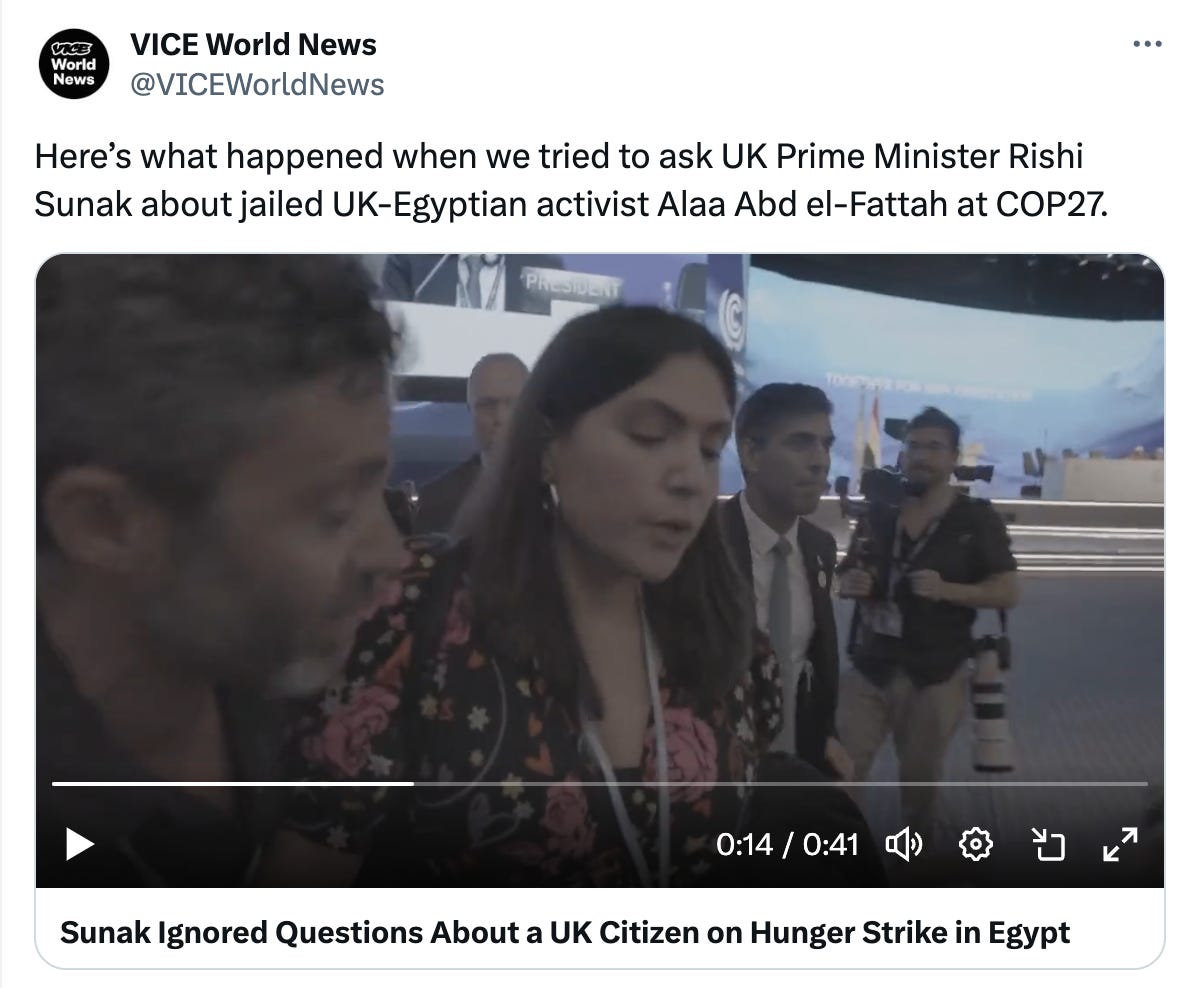On Labour & the Prospects for Alaa's Freedom
David Lammy is now Foreign Secretary - what might that mean for Alaa Abd el-Fattah, still imprisoned in Egypt
With the Conservatives finally out of power, could things be different for British nationals imprisoned abroad under Labour? We have been campaigning in Britain for over two years for an intervention to get the writer, Alaa Abd el-Fattah, who holds dual nationality, out of prison in Egypt. Though we won the official support of three successive Prime Ministers - Johnson, Truss and Sunak - the government seemed incapable, or unwilling, of doing anything other than making polite requests of the Egyptian regime. The British embassy in Cairo was - and remains - blocked from even visiting Alaa. Polite requests were rebuffed, successive Foreign Secretaries would shrug and we would return to zero. There were never any consequences, there was never a plan beyond hollow statements.
What are our prospects under Labour?
David Lammy, as Shadow Foreign Secretary, became an outspoken supporter of Alaa.
He joined us at a protest sit-in outside the Foreign Office:
He hosted Alaa’s sister on his radio show:
He wrote to the previous Foreign Secretary:
He called Alaa a “courageous voice for democracy” and rightly pointed out on Radio 4 that “we have a £4bn trading partnership with Egypt - that is tremendous leverage.” He questioned why the Egyptian ambassador in London continued to have unimpeded access to the government.
In parliament, he asked “what diplomatic price has Egypt paid for denying the right of consular access to a British citizen? And will the Minister make clear there will be serious diplomatic consequences if access is not granted immediately and Alaa is not released and reunited with his family?”
In fact, British nationals detained abroad became a cornerstone of Lammy’s manifest offer, with the promise to overhaul the consular assistance system and ensure British citizens have a legal right to it when arrested (it is currently down to the local embassy’s discretion). Alaa’s case is routinely mentioned as one of the most notable failures of consular assistance in recent years, as British officials continue to be denied access to him.
Further, Labour endorsed the findings of the Foreign Affairs Select Committee’s major report: Stolen Years: Combatting State Hostage Diplomacy. In it, the Committee argues for a complete overhaul of the Foreign Office’s practices, with a grand total of 36 specific recommendations, such as: regular Ministerial level contact with families; the appointment of a complex negotiations tsar with a direct line to the Prime Minister’s Office; forging a more constructive relationship with Parliament; not routinely falling back on “quiet diplomacy”; coordination between different ministries to create a unified governmental effort - such as the Ministry of Defence and the Ministry of Trade.
“Families” the report states, “should never be left to feel that the only way the Government will prioritise their case is by acting against advice and, in some cases, their better judgement, by going to the media and to Parliament.”
It is not an overstatement to say the previous government did, quite simply, nothing. In fact, they were worse than nothing - they actively undermined our family’s campaign in some instances by promising actions that they never took and discouraging assistance from potentially powerful allies. Boris Johnson, Liz Truss, Rishi Sunak all repeatedly told parliament and Alaa’s family that they were working for his release, while doing absolutely nothing about it. It is, in fact, no different from how they ran the country - they were not governing, and presiding over a worsening situation.
As a reminder, here’s Rishi Sunak’s letter of November 5th.
And here is Rishi Sunak three days later, in Egypt, running away from a question about Alaa when we had no idea if he was even alive or dead.
As Leader of the Opposition, Keir Starmer then questioned Sunak about Alaa - to applause from the house - and got no real answer.
Not only were the Conservatives undermining and gaslighting us, they were constantly signalling to the Egyptians that they did not care about Alaa. British International Investments - the government’s own investment company - announced a new £9bn investment in Egypt while Alaa was on hunger strike to win consular access from the British. Had the Conservatives wanted to solve Alaa’s case, that one deal need only have been put on pause until he was put on a plane.
The Conservatives are now gone.
Will Labour live up to their positions taken in opposition? The new Foreign Secretary has a strong personal track record of advocacy for Alaa and a stated understanding of the tools of economic and political leverage now available to him. His party has endorsed the Foreign Affairs Select Committee’s report with its long list of serious recommendations. And David Lammy’s own manifesto pledges have been repeated for over two years now. All taken together we can only hope that we are finally in a position to see a government actively engage on Alaa’s case.
Alaa was sentenced to five years. On September 29th Alaa will have served five years. Before that, it was another five years. He has only spent six months out of prison in ten years.
The Foreign Secretary must ensure that Alaa is released and put on a plane.
*****
Some initial diplomatic and economic steps for the new Foreign Secretary to consider:
Place conditions on the $400,000,000 Egypt is due to receive from the UK in direct aid in the coming two years.
Change the travel advice on the Foreign Office’s website to reflect the reality of the moment: that if you are arrested in Egypt they cannot guarantee consular access.
Convene a joint meeting of members of the Ministries of Defence and Trade to discuss a unified strategy.
Summon the Egyptian ambassador in London and inform him Alaa must be on a plane to the UK the day his sentence finishes on September 29th or his access will be restricted.
Announce a moratorium on any governmental assistance or promotion of new Foreign Direct Investments into Egypt.
Announce a moratorium on any new direct investments by companies owned by the Foreign Office, such as the scandalous green hydrogen plant above. British International Investments, which is owned by the Foreign Office, has 137 direct investments in Egypt - indexed here.
Inform the Egyptian authorities that Britain will make a negative submission at Egypt’s upcoming Universal Periodic Review at the Human Rights Council.
Exert pressure through the IMF’s loan negotiations with Egypt, where the UK has significant influence.
Reach out to European allies as part of the Foreign Secretary’s bridge-building. Alaa is also a priority figure for the EU, so co-ordinate with them. The EU has major leverage with Egypt now as part of an enormous new aid package.
Reach out to American allies. Alaa has long been a priority figure for the State Department. America has consistent and major leverage over Egypt as its second largest recipient of military equipment and other aid packages.








